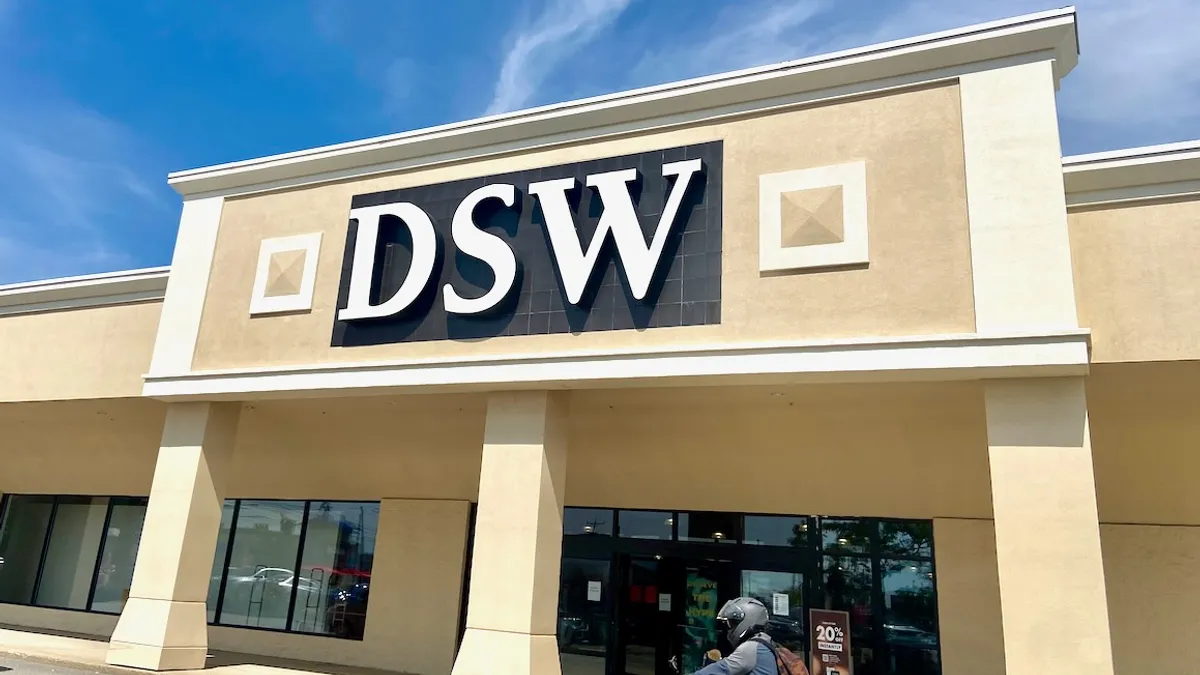It's been another week with far more retail news than there is time in the day. Below, we break down some things you may have missed during the week and what we're still thinking about.
From a David Hasselhoff Chia Pet to how Neiman Marcus feels about e-commerce splits, here's our closeout for the week.
What you may have missed
Target co-creates competition series for Black-owned startups
Target on Wednesday announced that it is launching a competition series featuring 12 Black-owned startups, dubbed "Bet on Black." The retailer will provide mentorship and a total of $500,000 in funding.
Participants will pitch their ideas to four judges, which include musical artist T-Pain, costume designer Zerina Akers, radio personality and record producer DJ Envy and Melanie Gatewood-Hall, Target's senior divisional of merchandising in apparel and accessories. Target partnered with multimedia platform Revolt to co-create the series premiering on Jan. 10.
Walmart-backed Symbotic is prepping for an IPO via a SoftBank-sponsored SPAC
This past July, Walmart announced that it was extending its partnership with robotics and automation company Symbotic to over half of its regional distribution centers.
Then, this week, Symbotic announced that it is going public via a special purpose acquisition company through a merger with SVF Investment Corp. 3, which is sponsored by an affiliate of SoftBank Investment Advisors. The combined company will operate under the Symbotic name, and will be listed on Nasdaq with the ticker "SYM." The merger is expected to be completed the first half of 2022, and is expected to raise $725 million in gross proceeds. The deal gives the company a pro forma equity value of $5.5 billion.
Former J.Jill CEO tapped to lead Janie and Jack
Upscale children's apparel brand Janie and Jack, acquired earlier this year by brand investment platform Go Global Retail from Gap Inc., has tapped retail veteran Linda Heasley as CEO, according to an emailed press release.
Heasley previously served as the chief executive officer at several prominent clothing brands including The Limited, Lane Bryant and J. Jill, as well as at the Honey Baked Ham Company, and remains chief executive of mobile app developer Downshift, according to this LinkedIn page.
Gap Inc. bought the two decade-old brand, which offers sizes from newborn through tween, in 2019 for $35 million during parent company Gymboree's bankruptcy, only to sell it two years later. Janie and Jack runs 117 stores and a website. Nearly all of its sales are in the U.S., with "strong interest developing from the Middle East, the UK and Europe," per the release.
The company is in the midst of upgrading various aspects of its tech in its quest for growth, Heasley said in a statement. "We aspire to build out our unified commerce platform to deliver best-in-class customer experiences across all channels of engagement," Heasley said.
Nike signs first college athlete to sponsorship deal
Nike this week announced that Reilyn Turner, a sophomore on the UCLA women's soccer team, will be the retail giant's first college athlete sponsorship after a ruling this summer by the Supreme Court, and subsequent rule changes by the NCAA, allowed players to monetize their name, image and likeness. Turner was the Pac-12's Freshman of the Year in 2020 and finished this season with 10 goals, according to Nike.
Nike is partnering with Turner to work with Los Angeles-based community partners, and the retailer said more broadly that its agreements with college student athletes in the U.S. will feature an element of giving back to their local communities.
"As a Black woman and Mexican American, I think about those who have paved the way for me and how they used their platforms to create so much change, even beyond sport," Turner said in a statement. "I hope to be a role model for those around me and those after me, and I'm so excited to be a part of what Nike is bringing to the future of women's sport."
Bark adds REI as latest wholesale partner
Further expanding its wholesale presence, Bark has added REI as a retail partner. The company — which runs subscription services BarkBox and Super Chewer, as well as wellness brand Bright and meal delivery service Eats — last week began selling select products in REI stores and online, according to Modern Retail.
The collaboration builds on Bark's growing list of retail partners, which include Amazon and Target. Entering physical retail in some capacity — whether through pop-ups, permanent stores of their own or with wholesale partners — has become critical for many DTC brands as the marketing costs associated with acquiring customers exclusively online become prohibitively high.
In its most recent quarter, Bark reported net revenue grew 39.1% to $120.2 million, while its advertising and marketing costs grew 31.8% to $17.1 million.
2021 has been a busy year for Bark. The company in June listed publicly on the New York Stock Exchange following a merger with special purpose acquisition company Northern Star Acquisition Corp.
But Bark has also experienced a shakeup to its C-suite: Chief Financial Officer John Toth announced in September he would be stepping down from his role. The company also named Anil Nair, who most recently served as director of global logistics at Amazon, to chief supply chain officer; Michael Novotny, who was Bark's chief operating officer, to president of Bark Eats; and Olly Downs, who came from Zulily, to vice president of data, analytics and machine learning.
Retail Therapy
Don't Hassel the Hoff with your chia problems
Do you want to be the talk of your white elephant holiday party? Then you absolutely need to obtain a David Hasselhoff Chia Pet.
The company just released The Hoff Chia Pet, and is also advertising a set of delightful characters that includes WILLIE FREAKIN NELSON and some child from a little known TV show called "The Mandalorian."
You know the drill: It's a terracotta planter. You put seeds on it. And in less than two weeks you are ch-ch-chia-ing your way to a home or office statement piece. You can find Chia Pets at many major retailers like Walgreens, Walmart, Target and Amazon.
Here's a commercial of Chia Pets from the '90s because I know you will want to sing the song.
Oh, dip. They also have Pennywise the Clown. I just looked that up in the middle of reporting this and am amazed. They also have Elvira, RuPaul and Richard Simmons. What a time to be alive.
What we're still thinking about
16.4%
That's how much November's retail sales rose year over year among the core group Retail Dive tracks. Compared to 2019, sales soared 26.7%.
All sectors tracked experienced gains from a year ago: apparel up 42.3%, sporting goods (25%), home goods (23.8%), general merchandise (15.1%), e-commerce (10.8%) and electronics (9.4%).
7.5%
That is the decline in seasonal hiring across the retail industry this holiday season compared to last year, according to figures from Challenger, Gray & Christmas. In all, the firm forecasted that retailers would hire 700,000 workers this holiday season, down from 736,000 in 2020.
The drop in hiring comes as sales are expected to rise significantly over last year. The industry writ large has pointed to labor shortages as a strain on operations. Among the jobless, the top reasons cited for their unemployment were physical health issues (30%), mental health (15%) and the need to care for family (12%), according to a recent McKinsey survey.
What we're watching
Neiman Marcus CEO rejects idea of e-commerce spinoff
If Neiman Marcus ends up contemplating a split of its e-commerce and brick-and-mortar operations, that would apparently be contrary to its chief executive's wishes.
CEO Geoffroy Van Raemdonck on Wednesday drew a line in the sand, contrasting its strategy of integrating its online and offline business with the approach at rival luxury department store Saks Fifth Avenue. That company, along with HBC siblings Saks Off 5th and Hudson's Bay Co., split its online and offline operations earlier this year. "That's not … for us," Van Raemdonck said in comments emailed to the press.
If the retailer is getting any pressure to make such a move, Van Raemdonck didn't let on. But it wouldn't be a surprise, considering that the financier-friendly maneuver is being floated by investors at other department stores, including Macy's and Kohl's. After what many observers perceived as pushback at Macy's, that department store last month said it has hired the same firm that Saks employed to engineer its split to explore growth alternatives.
Growth won't necessarily be the outcome, however, according to several industry observers.
"For the brand, divestiture is problematic," retail consultant Brian Kelly said by email, noting the difficulties in maintaining consistency in assortment and price or dealing with backend needs like returns. "For the shopper, it might be moot. For the shareholder, divestiture might be the best approach to see acceptable rates of return on the investment. Net, net it's a nuisance, but in and of itself activist shareholders shouldn't overly distract brand leadership."






















